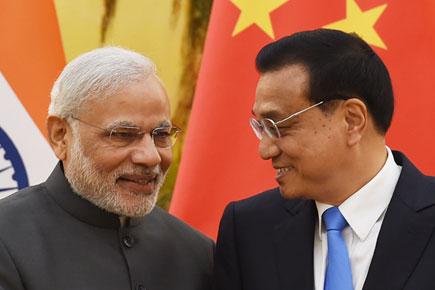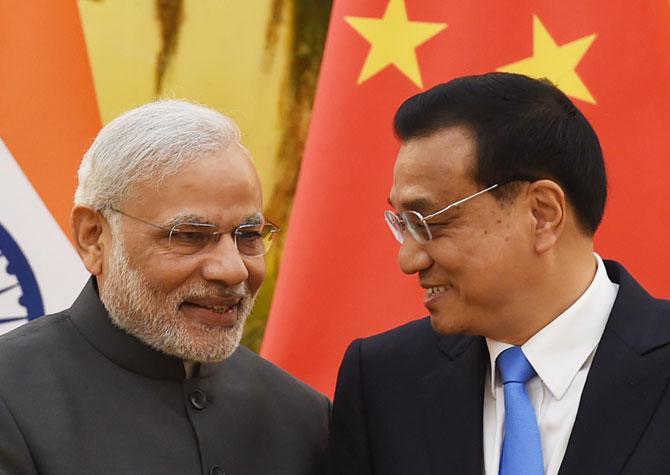India and China today vowed to seek a 'political' solution to the boundary issue and proactively resolve it as early as possible amid Prime Minister Narendra Modi's emphasis that the dispute should not prevent progress in ties

India's Prime Minister Narendra Modi (L) chats with Chinese Premier Li Keqiang after a joint press conference in the Great Hall of the People in Beijing. Pic/AFP
Beijing: India and China today vowed to seek a 'political' solution to the boundary issue and proactively resolve it as early as possible amid Prime Minister Narendra Modi's emphasis that the dispute should not prevent progress in ties which have been 'complex' in the recent decades.
ADVERTISEMENT
Modi asked China to 'reconsider' its approach on some matters, like visa policy towards residents of Arunachal Pradesh, as he asserted that the two nations have a 'historic responsibility' to turn the relationship into 'a source of strength for each other and a force of good for the world.'
 India's Prime Minister Narendra Modi (L) chats with Chinese Premier Li Keqiang after a joint press conference in the Great Hall of the People in Beijing. Pic/AFP
India's Prime Minister Narendra Modi (L) chats with Chinese Premier Li Keqiang after a joint press conference in the Great Hall of the People in Beijing. Pic/AFP
During their wide-ranging talks here, Modi and his Chinese counterpart Li Keqiang decided to increase the number of border meeting points of their military personnel from the existing four as they underlined that maintenance of peace and tranquility on the border was an 'important guarantor' for the development and continued growth of ties.
Modi, while making clear that there was 'no question of going back', asserted that 'standing still was not an option' and 'moving forward is the only way out' in the relationship that has been 'complex' in the last few decades. The Indian leader sought tangible progress on issues relating to visa, an apparent reference to stapled visas issued by China to residents of Arunachal Pradesh, as he underlined that the two countries need to be 'sensitive to each other's interests'.
He stressed the need for strengthening mutual trust and confidence while seeking solutions to outstanding issues. The two sides signed a record 24 agreements covering railways, mining, outer space, earthquake science and engineering, tourism, sister-cities and establishment of consulates in Chengdu and Chennai.
"The two sides affirmed that an early settlement of the boundary question serves the basic interests of the two countries and should be pursued as a strategic objective by the two governments. "Bearing in mind the overall bilateral relations and the long-term interests of the two peoples, the two sides are determined to actively seek a political settlement of the boundary question," said a Joint Statement after the meeting.
It added that the "two sides will resolve outstanding differences, including the boundary question, in a proactive manner. Those differences should not be allowed to come in the way of continued development of bilateral relations."
 Subscribe today by clicking the link and stay updated with the latest news!" Click here!
Subscribe today by clicking the link and stay updated with the latest news!" Click here!







